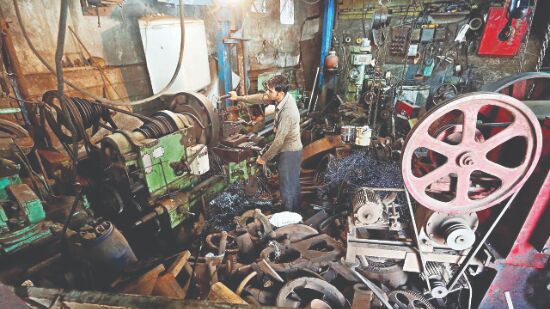An emergent need
Non-compliance with CP norms resulting from loopholes in the sustainability laws and laxity on part of managements is causing great damage to environment

In areas close to industrial sectors, the production of pollutants — particularly from Small and medium scale enterprises (SMEs) — has damaged the natural environment by excess emission of wastewater, gas or other solid wastes. Environmental agencies are failing miserably in controlling pollution. SMEs contribute a significant fraction of the total environmental burden in developing countries like India. The consumption of huge quantities of resources and energy for industrial production within a short period had a far-reaching influence on the natural environment. Reducing this burden requires environmental improvement at the micro-level, which has been stubbornly elusive in India.
The major problems in SMEs are old technologies, poor management practices, limited availability of funds, inadequately trained officials, lack of appropriate inspection and monitoring, the overall gap between enforcement agencies, industries and communities because of impassivity of top management in the environmental sector and political will. Regulatory pressure on the SMEs could not implicate a positive effect on the environment in areas such as foundry, sponge iron, electroplating industry, food processing, tannery and others.
Environment sustainability has been practically jeopardized. The possible reason is the establishment of several industrial complexes without consideration of environmental and social impacts. This dismal scene of ES in India remains well hidden because social aspects such as human rights, corruption, poverty, child mortality, land degradation etc., and their interrelation with economic and environmental aspects are not considered duly by regulatory agencies. The traditional approach of enforcement of environmental acts and regulations fails to explain and address the complex dynamic inter-relation among economics, environmental and social aspects. Though environmental impact assessment and environmental management system under the Environment (Protection) Act are mandatory before implementing any project, the ES and social benefits have remained questionable.
A survey of industries reveals that SMEs are mainly dependent on end-of-pipe (EOP) technology whose functionality is not consistent. Regulatory pressure compelled these industries to install pollution control system for compliance with standards. But non-compliance is a common feature due to non-availability/non-operation/failure of a pollution control system. Environmental managers can easily control the pollution level within the permissible limit during the annual/biannual inspection by manipulating raw materials feeding and/or by operating the pollution control devices. Further, the vague evaluation of compliance level by regulatory authorities results in the same penalties for major and marginal violations.
As an in-depth study is not always feasible, enforcement agencies emphasize performance evaluation of EOP technology without considering ecological and social factors. As a result, owners of the industries are not serious to initiate Clean Production (CP) despite its economic benefits. Owners are rather well-versed to tackle the adverse situation in a shorter span to keep their units in operation in response to non-compliance notices by regulatory authorities. This hides actual compliance status over time, leaving environmental and social problems unattended.
It may be mentioned in this context that the majority of residents are poor and do not have access to higher authority for resolution of their problems as well as they are not well-educated to explain their sufferings to media in light of the ecological crisis created by these industries. The government has already launched various projects to reduce poverty, educate the people, provide health facility and create environmental awareness, but the implementation status of these projects is not always satisfactory. Limitations in the government's actions to solve the problems are not disseminated via media for public awareness due to various reasons. Moreover, the accountability of government employees for implementing the projects in terms of success and failure is not properly evaluated due to lacking knowledge and effort.
This problem within a regulatory organisation may be attributed to top management persons because they often recruit either new scientists/engineers or retired government engineers/scientists based on political connections or bribes to look after activities related to environmental management. On the other hand, the huge potential offered by the country's young population is far from being leveraged. Also, many highly qualified young scientists/engineers refuse to take up the challenging works related to environmental management in these organisations due to the lack of knowledgeable and skilled experts to guide the newly recruited personnel as well as hostile environment and bureaucracy.
This is a disturbing situation. India needs innovative minds to meet the formidable challenges. For this, both the state and Central governments should take urgent action and must appoint highly qualified, broad-minded officers, who will recruit qualified competent engineers/scientists and provide them with state-of-the-art technology based on sound scientific evidence without any external interference. Fixing our organization system will require a complete overhaul of the recruitment system, changes in environmental policy and implementation of the CP concept in all SMEs. According to UN Environmental Programme (UNEP), CP is the application of an integrated and preventive environmental strategy towards processes, products and services, to increase the overall efficiency and reduce damages and risks for humans and the environment. However, this will be difficult with the present disconnect between science and policy in these organisations.
As per my experience, the economic efficiency of CP is well-established through incremental innovation based on production process optimization and thereby the payback period of investment towards CP technology is short. Unfortunately, in India, the actual level of implementation of CP in industries, particularly SMEs is not determined. Evaluation of actual environmental and economic performance improvement is an emergent need to maintain sustainable industrial development, social welfare, social equity and a sound ecosystem. In India, the manufacturing industries and the government can play a major role in ensuring sustainable development. Community pressure followed by enforcement of environmental Acts and regulations has slowly changed the attitude of these industries but overall success towards consistent compliance is still a distant dream.
The writer is a former Senior Scientist, Central Pollution Control Board. Views expressed are personal



